Bashar al-Assad launches deadly counter-offensive as Putin airstrikes kill civilians after Syrian rebels ‘take Aleppo’
The Syrian army has brought in reinforcements to attack Idlib in an attempt to stop the advance of rebels who retook Aleppo from murderous dictator Bashar al-Assad this weekend.
The insurgents, led by the Salafist jihadist group Hayat Tahrir al-Sham, took over most of Aleppo on Saturday and claimed to have invaded the city of Hama. There was no independent confirmation of their claim.
The swift and surprising offensive is a huge embarrassment for Syrian President Bashar Assad and raises questions about the preparedness of his troops.
It also comes at a time when Assad’s allies – Iran and its backed groups and Russia – are preoccupied with their own conflicts. But despite this, Russia has provided significant support in the form of deadly missiles, which today killed eight civilians in Idlib, including two children and a woman.
The rockets also injured more than 50 people.
Iranian Foreign Minister Abbas Araghchi will travel to the Syrian capital Damascus later today. He told reporters that Tehran will support the Syrian government and army.
Arab leaders, including Jordan’s King Abdullah II and the President of the United Arab Emirates, Sheikh Mohammed bin Zayed Al Nahyan, expressed solidarity with Damascus in talks with Mr Assad.
Turkey, a key backer of Syrian opposition groups, said its diplomatic efforts in recent weeks have failed to stop the Syrian government’s attacks on opposition-held areas.
Britain’s Foreign Office said the situation is Assad’s fault for relying on Russia and Iran, while calling for a “Syrian-led political solution to the conflict.”
The Britain-based Syrian Observatory for Human Rights said nearly 400 people had been killed since Wednesday, including almost 50 civilians.
Smoke rises after airstrikes in Idlib, northern Syria, December 1, 2024
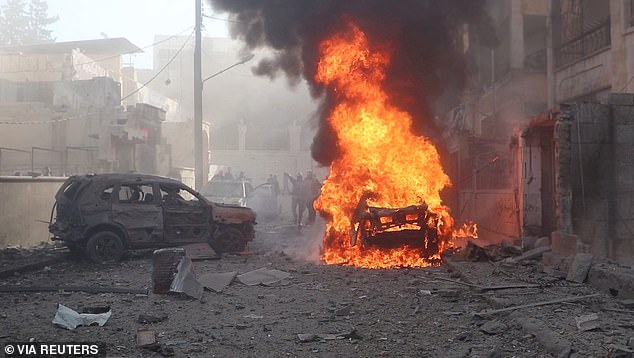
A view of a vehicle on fire in the aftermath of what the White Helmets say is a strike, in Idlib, Syria, released December 1, 2024
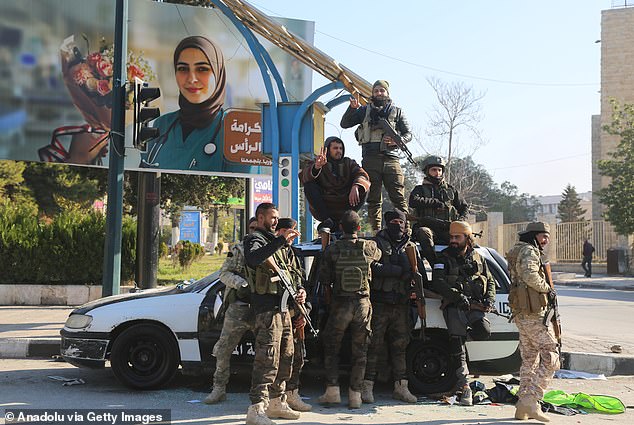
Armed groups opposing the regime of Syrian President Bashar al-Assad took control of much of Aleppo’s city center in Syria on November 30, 2024.
Turkish security officials said a limited rebel offensive was planned to stop government attacks and allow civilians to return, but the offensive expanded as Syrian government forces began withdrawing from their positions.
The insurgents, led by Hayat Tahrir al-Sham and which also includes Turkish-backed fighters, launched their offensive on Wednesday with a two-pronged assault on Aleppo and the Idlib countryside before moving towards Hama province.
In Aleppo province, they captured a strategic city located on the highway connecting Aleppo with Damascus and the coast.
Rebel commander Col. Hassan Abdulghani said his fighters are making gains in Aleppo despite the government’s counteroffensive. He said they had taken control of Sheikh Najjar, also known as the Aleppo Industrial City, the Aleppo Military Academy and the Field Artillery School.
He added that 65 Syrian troops were captured in eastern Aleppo.
Elsewhere, he said the insurgents were advancing into rural Idlib, bringing the entire province under their control.
The United Nations special envoy for Syria said the rebel shockwave poses a risk to regional security and called for a resumption of diplomatic efforts to end the conflict.
“I have repeatedly warned about the risks of escalation in Syria, about the dangers of mere conflict management rather than conflict resolution,” Geir Pedersen said in a statement.
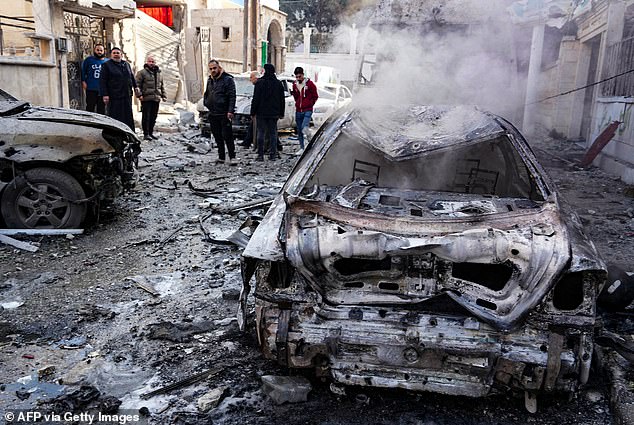
People view damage at the site of a Syrian regime airstrike that targeted a neighborhood in Syria’s rebel-held northern city of Idlib on December 1, 2024.
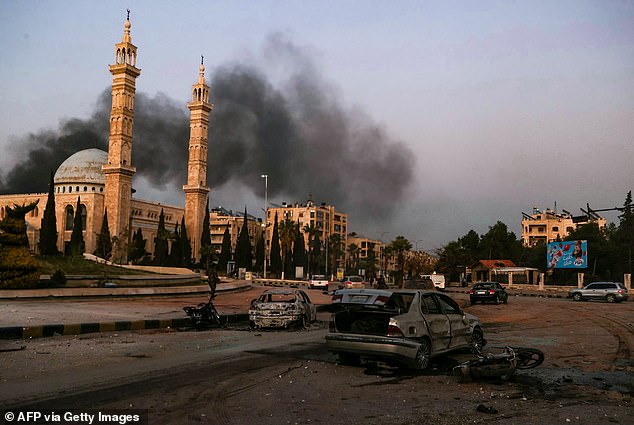
Clouds of smoke in the distance as damaged cars are seen at the site of Syrian regime airstrikes on anti-regime fighters in Aleppo, northern Syria on November 30, 2024
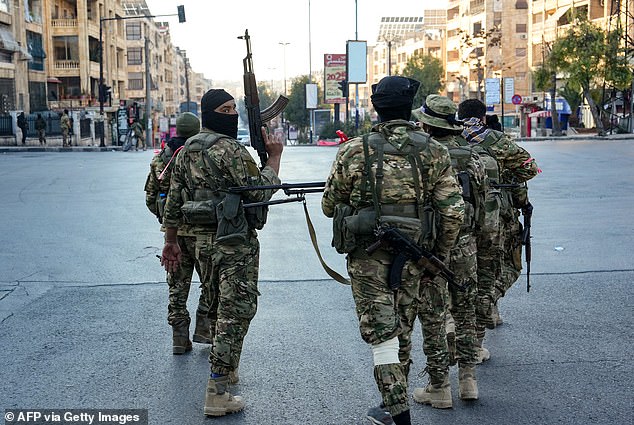
Anti-government fighters patrol central Aleppo on November 30, 2024.
He added that the reality is that no Syrian party or group of actors can resolve the conflict through military means.
The army pushed back rebels in the northern countryside of Hama province overnight, according to Syria’s state news agency Sana and a war monitor.
Syrian state media said the government supplies included heavy equipment and rocket launchers, while Syrian and Russian airstrikes targeted weapons depots and rebel strongholds.
Britain-based opposition war monitor the Syrian Observatory for Human Rights said government reinforcements were creating a “strong defense line” in the northern countryside of Hama.
Syrian state television claimed that government forces have killed nearly a thousand rebels in the past three days, without providing evidence or details.
Government airstrikes in Idlib on Sunday killed at least three civilians, including two children, and wounded 11 other people, said the Syrian Civil Defense, known as the White Helmets, which operates in opposition-held areas.
Among those targeted was the Aleppo Hospital University in the city center, although there was no word on casualties.
The rebels vowed to push all the way into Damascus, but life in the Syrian capital remained normal and there were no signs of panic.
In his first public comments since the start of the offensive, released Saturday evening by the state news agency, Assad said Syria “will continue to defend its stability and territorial integrity against terrorists and their supporters.”
He added that Syria is capable of defeating them no matter how fierce their attacks become.
Calling his enemies terrorists, Assad also stated: “Terrorism understands only the language of violence, and that is the language with which we will break it and eliminate it.”
The 2016 battle for Aleppo was a turning point in the war between Syrian government forces and rebel fighters, after protests against Assad’s rule turned into all-out war in 2011.
After seemingly losing control of the country to the rebels, the fighting in Aleppo secured its grip on strategic areas of Syria, with opposition factions and their foreign backers controlling areas on the periphery.
